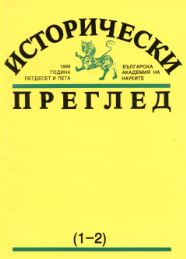Аверкий Петрович – един светъл образ от Българското възраждане
Averkii Petrovich – A Bright Figure from the Bulgarian National Revival
Author(s): Konstantin HamamdjievSubject(s): History, Political history, Social history, Modern Age, Special Historiographies:, 19th Century, Period(s) of Nation Building, The Ottoman Empire
Published by: Институт за исторически изследвания - Българска академия на науките
Keywords: Bulgarian national Revival; the Sopot monastery; Metropolitan of the Vratsa diocese; Constantinople
Summary/Abstract: Averkii Petrovich was one of the figures who distinguished themselves in the field of education during the mature period of the Bulgarian national Revival. From his youth to his death he devoted himself with consistency and zeal to the modernization of the Bulgarian society that had lagged behind owing to the centuries long isolation from the development of Europe. A. Petrovich was born about 1829 in Sopot at the foot of the Stara Planina Mountains. Very young he became a monk at the Sopot monastery, and in 1845 entered the Belgrade seminary. During his studies in Belgrade which he successfully ended in 1848 he translated two Serbian books. After his return to Sopot, without leaving the monastery, for a few years he worked as teacher in the school there and continued to translate books. In 1858 A. Petrovich left for Kiev and joined the Kiev Theological Academy. Four years later his thirst for knowledge led him to Dresden where he studied German and French and continued to occupy himself with literature. In 1865 Petrovich went again to Belgrade and afterwards to other Serbian towns where he worked as a school master and continued to translate. At that time he did not dare to return to his motherland, fearing persecution by the Patriarchate of Constantinople. In 1872, after a prolonged struggle, the newly established Bulgarian Exarchate began to function and A. Petrovich was elected Metropolitan of the Vratsa diocese. Unfortunately, he soon clashed with the contradictory interests of the Turkish administration and the Bulgarian church community. Although highly educated, he lacked the practical skill to overcome complicated political situations. This compelled him after one year to hand in his resignation and to return to Constantinople. There for another few years he engaged in ecclesiastical and literary work, and died in early 1878, only months before the establishment of the new Bulgarian State.
Journal: Исторически преглед
- Issue Year: 1999
- Issue No: 1-2
- Page Range: 113-137
- Page Count: 25
- Language: Bulgarian
- Content File-PDF

